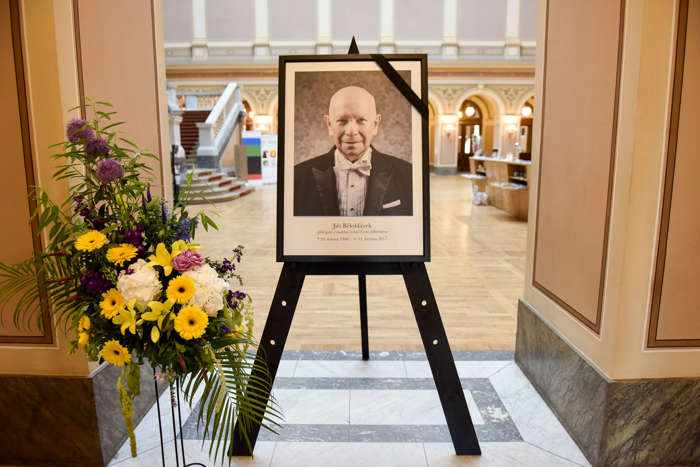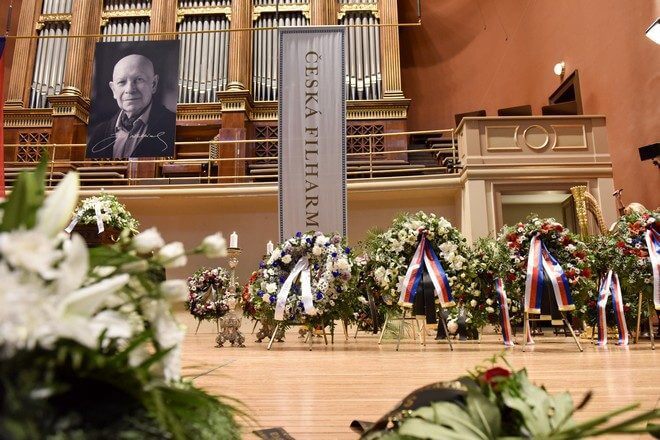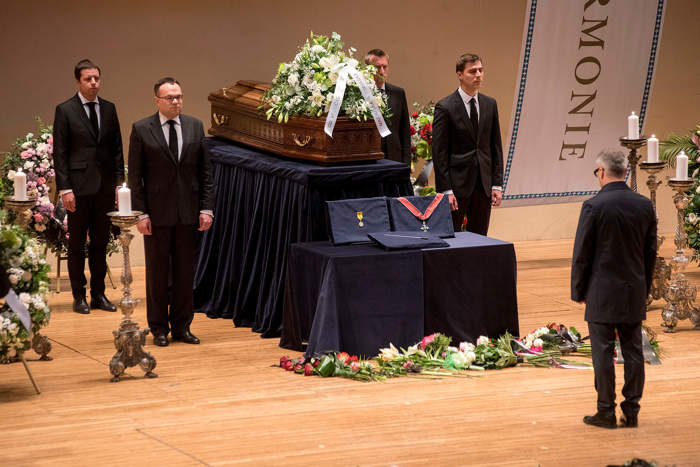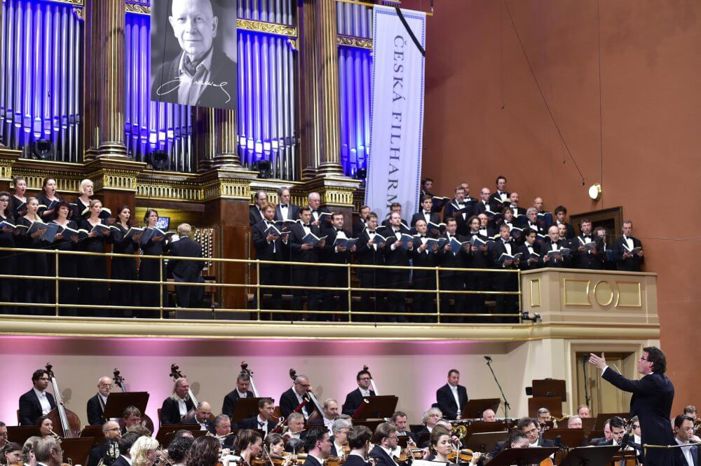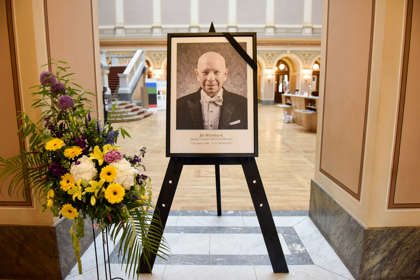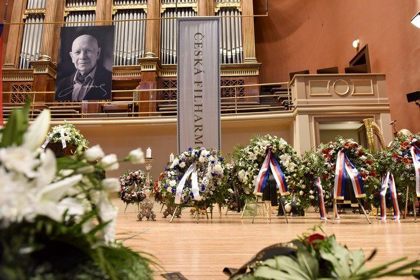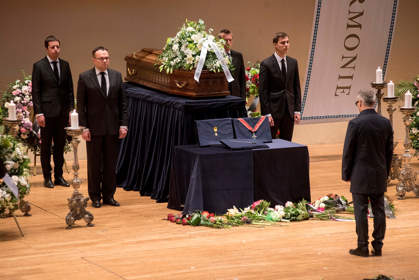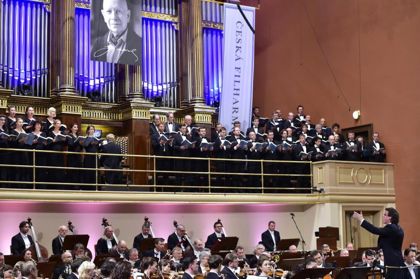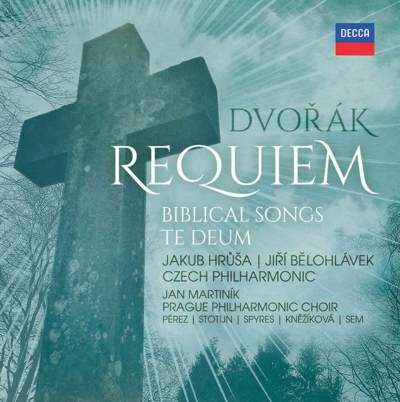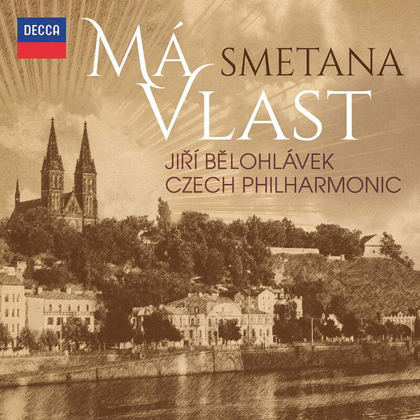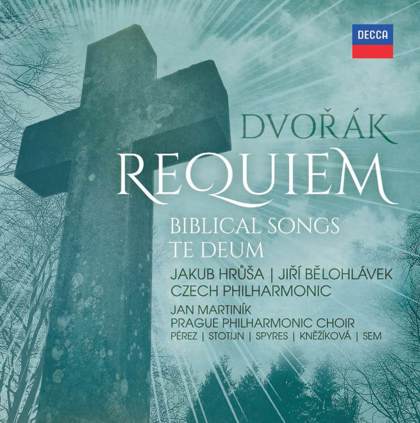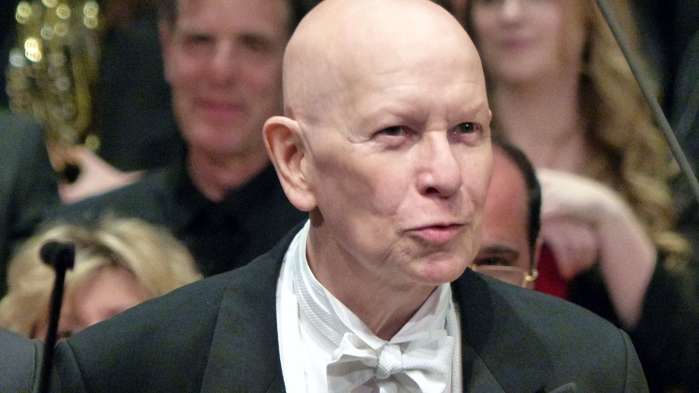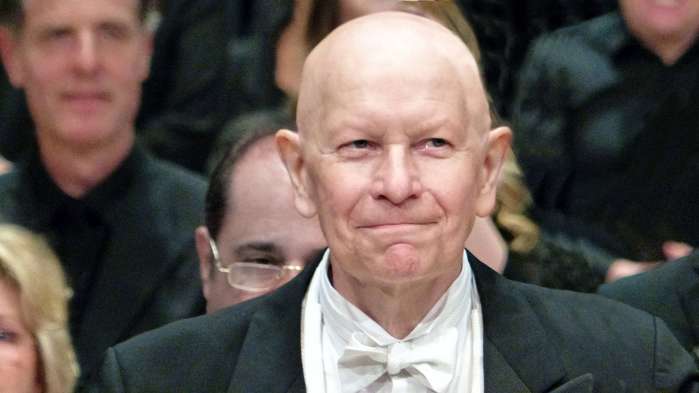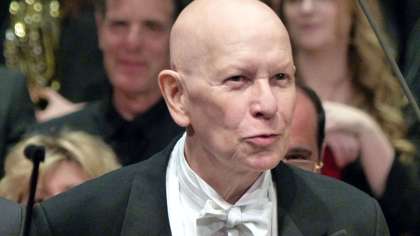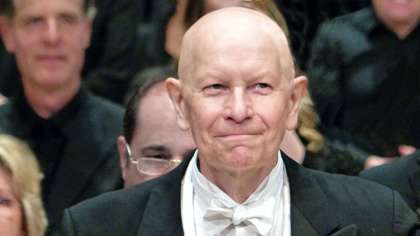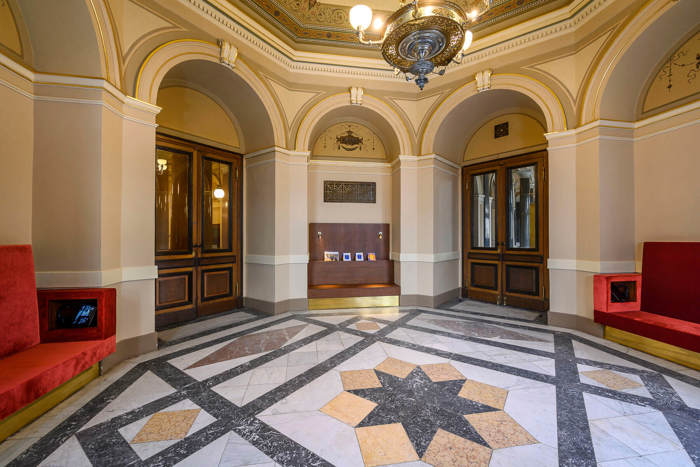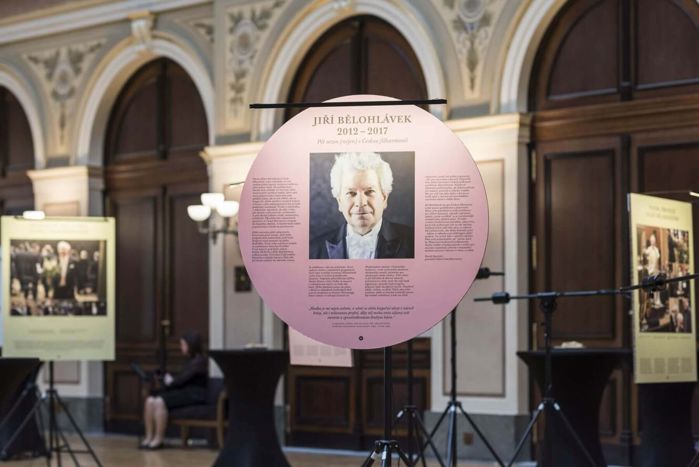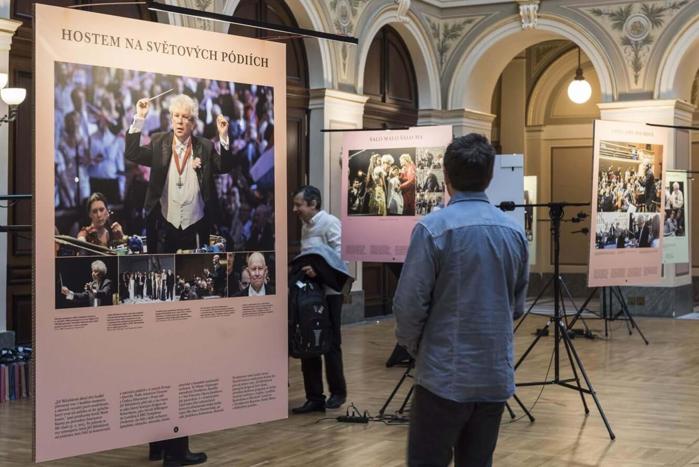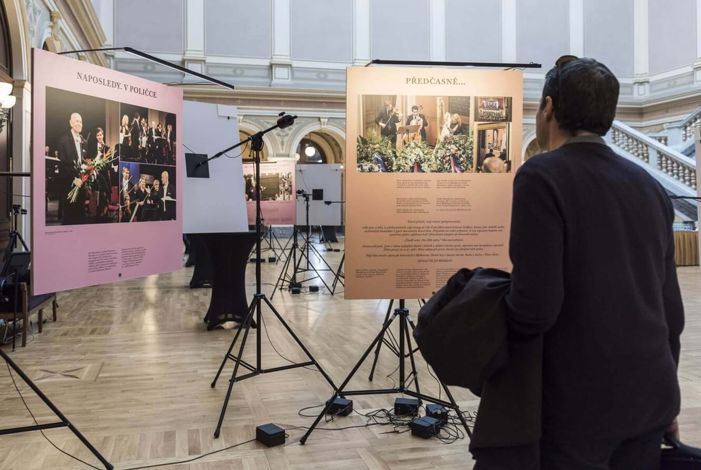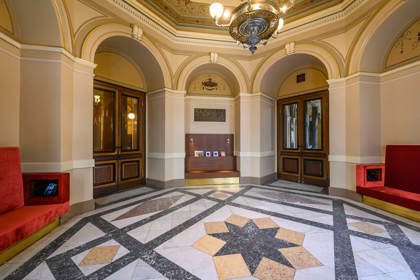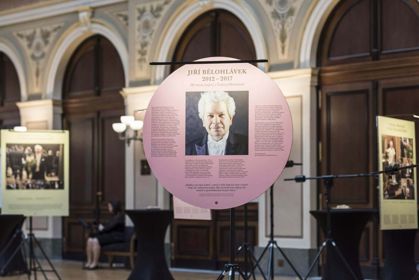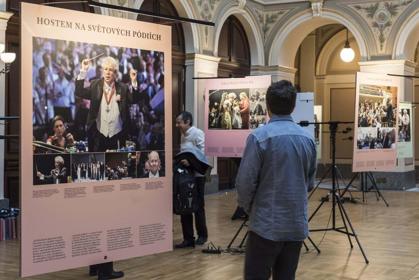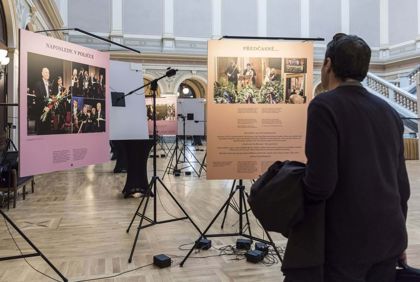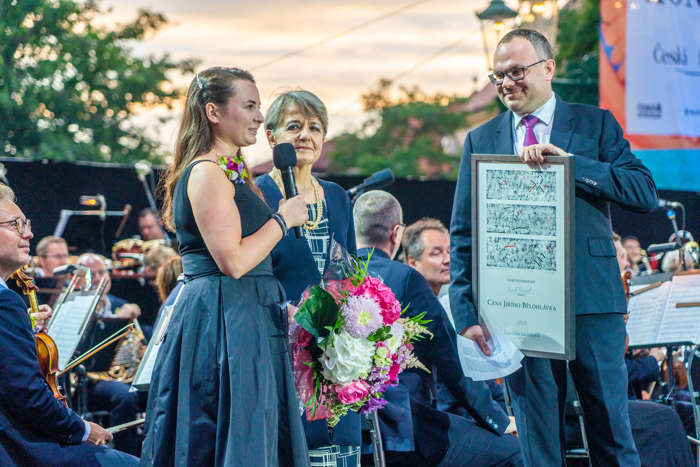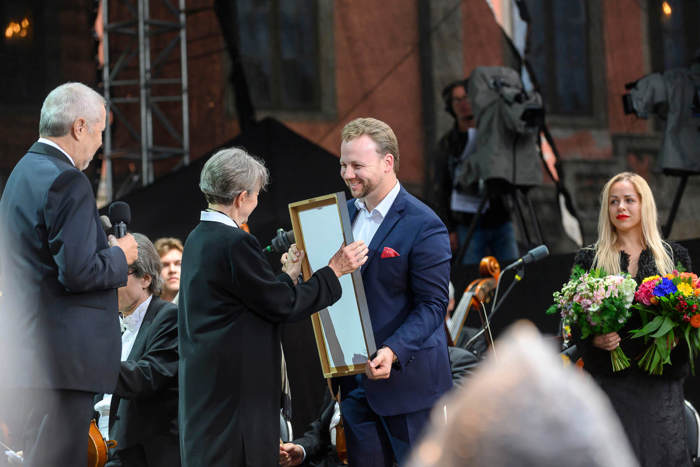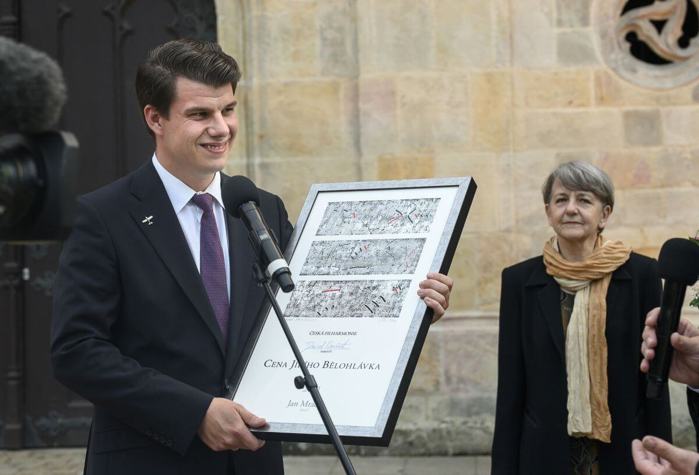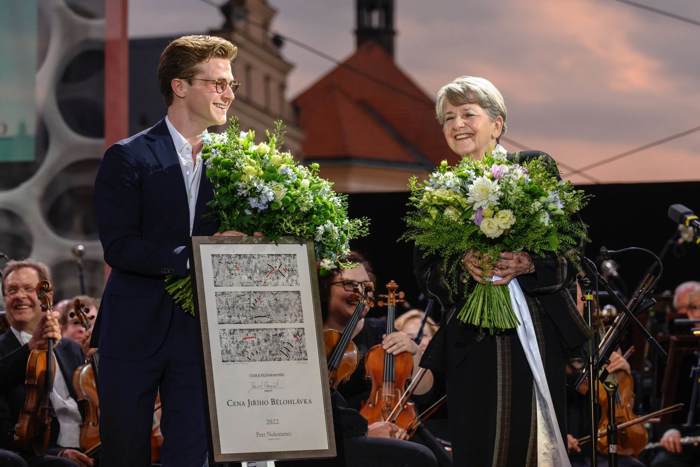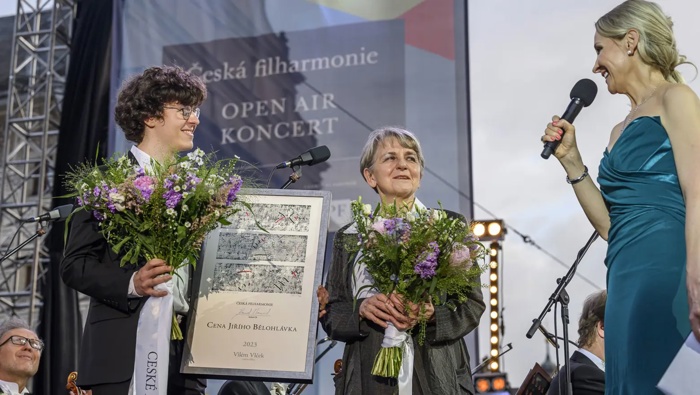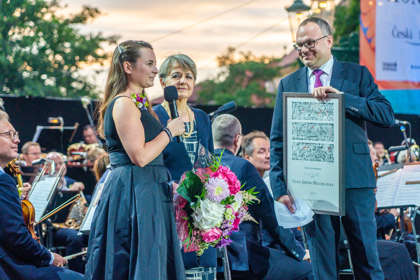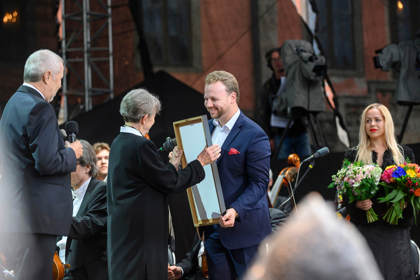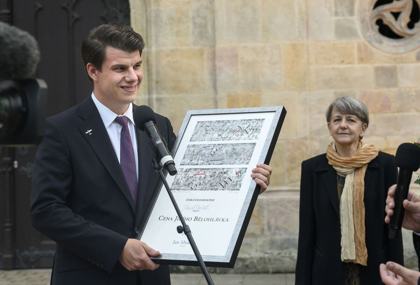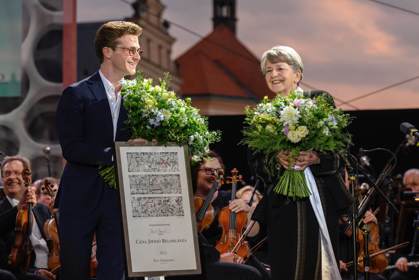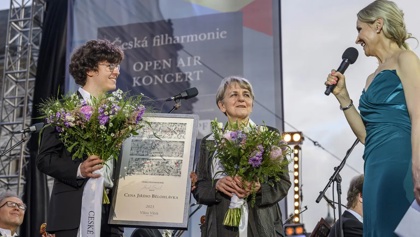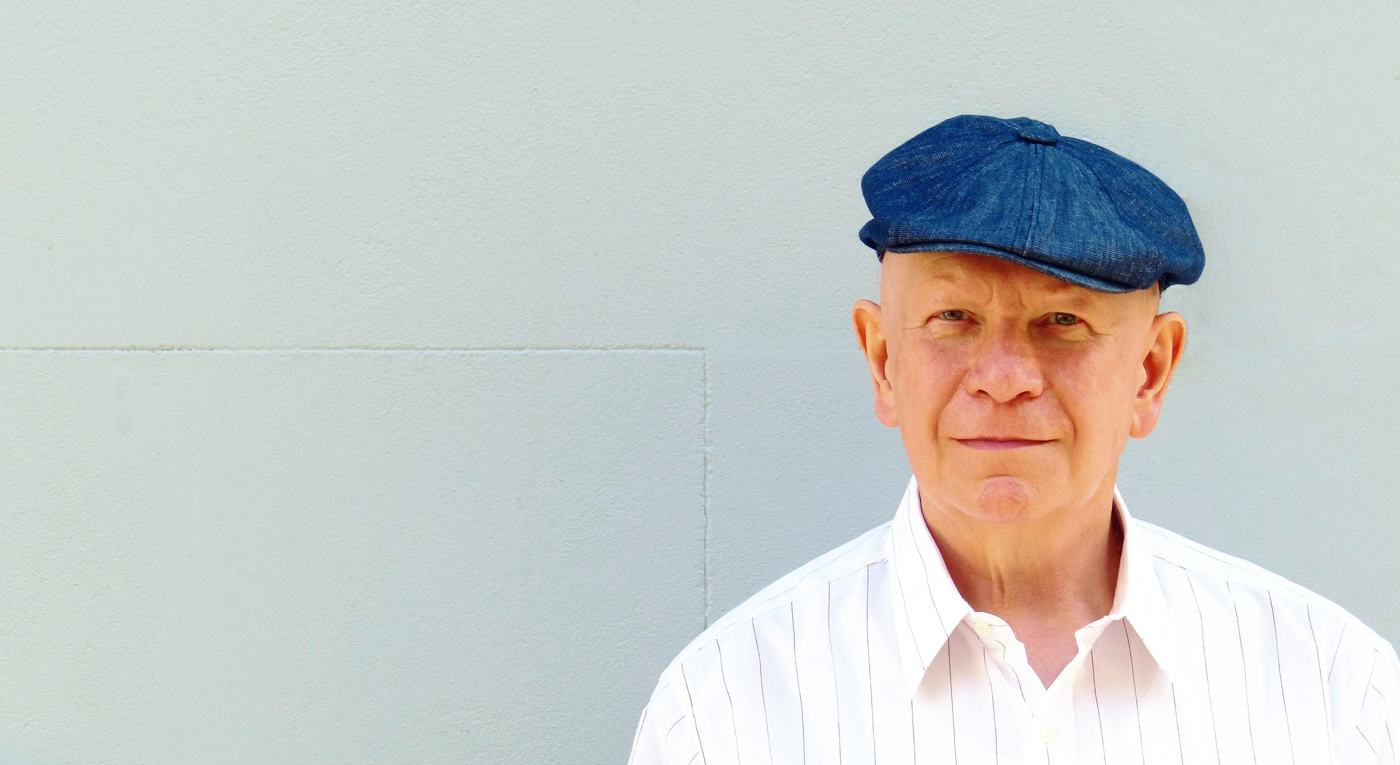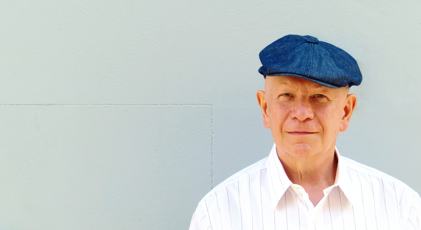“It feels as if it happened as much recently as ten years ago. What struck me most about his death, was the realization that whilst his personal loss is so tragic and he will be sorely missed, his tremendous and unparalleled artistic experience and spirit, which I so admired, has suddenly vanished as well. He was able to pass some of it onto his students, yet it is his own physical presence on stage, his very own ability to get the absolute maximum out of each performer and transform it all into a magnificent whole, that I shall never experience again.”
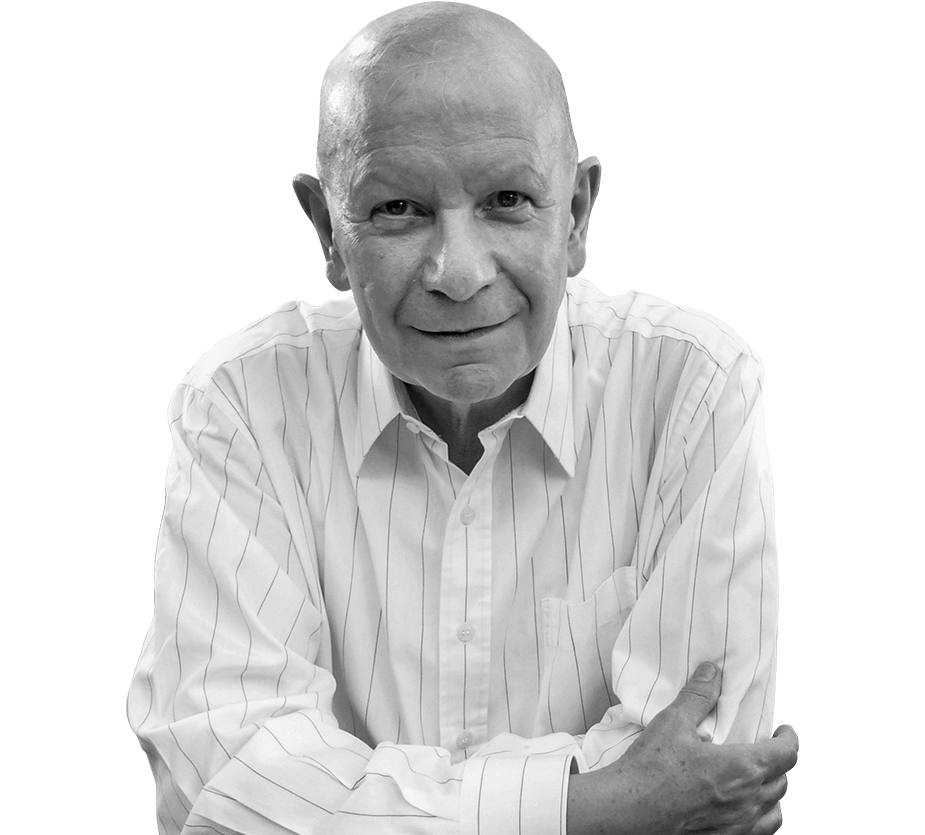
The media both in the Czech Republic and abroad and many important people reacted to Bělohlávek’s passing. The famous Polish conductor Krzysztof Penderecki dedicated his final concert of the Prague Spring Festival on 3 June 2017 to Jiří Bělohlávek. Many obituaries and articles recounting Bělohlávek’s career appeared, assessing his artistic contribution. To name but two well-informed obituaries: Boris Klepal’s for Aktuálně.cz a Daniel Konrád’s v Hospodářských novinách.
The last public farewell to Jiří Bělohlávek took place on 7 June 2017 in the Dvořák Hall of the Rudolfinum. Members of the management and the orchestra stood guard of honour at the coffin. The ceremony was accompanied by music provided by about twenty members of the Philharmonic. Semyon Bychkov, the chief-conductor-to-be, was deeply touched by the ceremony: “In no way were we prepared for his death. When it happened last year, I came to Prague and attended the ceremony. I was deeply touched by all the Czechs coming to bid farewell to Bělohlávek. How they cried and showed respect. I know it, I was in the auditorium and observed it open-mouthed. At one point, one of the orchestra members came to bow to the coffin dressed in a tailcoat. A tailcoat! It was 2 p.m. and he put on a tailcoat to honour Jiří.” [ 2 ]
On 11 June, the PKF – Prague Philharmonia performed Brahms’ German Requiem at the Municipal House, honouring the memory of their founder, year-long conductor and supporter. The Czech Philharmonic bade farewell to their beloved chief conductor on 18 June 2017 at the Rudolfinum when, under the baton of Bělohlávek’s former student Jakub Hrůša and together with the Prague Philharmonic Choir, they performed Dvořák’s Stabat Mater. The solo parts were sung by Kateřina Kněžíková, Kateřina Jalovcová, Pavel Černoch and Jan Martiník. The Brno Philharmonic Orchestra organized a requiem mass for Jiří Bělohlávek on 20 June at the Jesuit church in Brno, performing Fauré’s Requiem. It was performed by an orchestra composed of players from the Brno Philharmonic and their colleagues from Brno theatres and a mixed choir, conducted by Jakub Klecker.
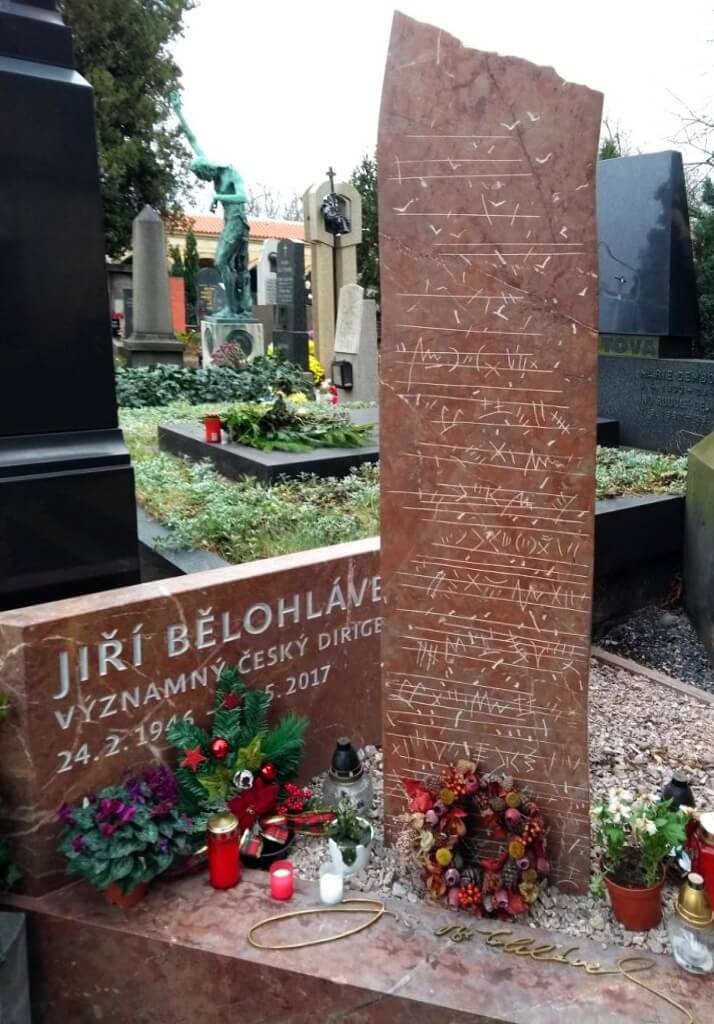
The Vyšehrad Cemetery: the place of Jiří Bělohlávek’s final repose
Jiří Bělohlávek is buried in the Vyšehrad cemetery surrounded by prominent composers, conductors and other personalities, many of whom he had collaborated with or whose work he performed. Bělohlávek’s grave is located to the right when entering through the cemetery gate at the Basilica of Sts Peter and Paul. The tombstone was designed by Bělohlávek’s long-time friend, the artist Jiří Voves.
Despite the terrible loss that Bělohlávek’s passing meant, cultural life continued. The Czech Philharmonic had to solve the situation and start negotiations about appointing a new chief conductor. He was found quickly and announced already at the start of the 122nd season. Semyon Bychkov, elected unanimously by the orchestra, succeeded Bělohlávek and became the chief conductor and music director starting in the 2018/2019 season. Bychkov was complemented by two principal guest conductors, both of whom had been Bělohlávek’s students and had a promising international career, Jakub Hrůša and Tomáš Netopil.
In the following months and years, the Decca label gradually released recordings that Bělohlávek made with the Czech Philharmonic after he was appointed in 2012: In January 2018, Smetana’s Má vlast from the Prague Spring Festival 2014; in August of the same year, Janáček’s Glagolitic Mass, recorded on 10 March 2013 at the Rudolfinum; and Josef Suk’s masterpieces – Fairy Tale and Asrael in April 2019.
The releasing of Bělohlávek’s last recordings was concluded in March 2020 by two CDs of the Czech Philharmonic presenting Dvořák’s Requiem, Biblical Songs and Te Deum. The Biblical Songs with Jan Martiník as the soloist was Bělohlávek’s very last recording made in February 2017, three months before his passing. The Requiem with soloists Ailyn Pérez, Christianne Stotijn, Michael Spyres and Jan Martiník and the Prague Philharmonic Choir led by Lukáš Vasilík was conducted by the principal guest conductor of the Czech Philharmonic Jakub Hrůša, as was the Te Deum with Kateřina Kněžíková, Svatopluk Sem and the Prague Philharmonic Choir.
In August 2017, Supraphon released a recording of Mozart’s Piano Concertos No. 12 and 20 with Jan Bartoš on the piano and the Czech Philharmonic. The same label remembered Jiří Bělohlávek by a release in May 2018 of a set of eight CDs called Recollection with Bělohlávek’s twenty-three famous as well as lesser-known recordings made between 1971 and 2016. In addition to famous compositions by Smetana, Dvořák, Suk and Janáček, the set offered Zdeněk Fibich’s Symphony No. 3 E minor and pieces by Béla Bartók and Arnold Schönberg. All Czech orchestras which Bělohlávek worked with on a long-term basis are represented in the set: the Brno Philharmonic, the Prague Symphony Orchestra FOK, PKF – Prague Philharmonia and, of course, the Czech Philharmonic. In October 2018, the same label released a recording of a concert performance of Martinů’s opera What Men Live By complemented by Martinů’s Symphony No. 1. And to make the list complete, Bělohlávek’s recordings of F. Lizst’s Piano Concertos No. 1 and 2 with the Brno Philharmonic and Valentina Kameníková, originally recorded in 1976 (released a year later), were reissued in 2018 as part of a double-CD entitled Valentina Kameníková – Piano.
During the last two years of Bělohlávek’s life, Roman Vávra was filming a documentary about him entitled “But I Love Conducting So Much …”. The film was co-produced by the Czech Philharmonic and the Czech Television and captures Bělohlávek at rehearsals, concerts, giving interviews, contemplating, and uses also material from family archives. The film bears witness to Bělohlávek’s exceptional relationship to the Czech Philharmonic and to his lifelong passion and devotion to music and his profession. The preview of the film was in December 2018 and on 26 September 2019 the documentary had its premiere at the “New Scene” of the National Theatre within the Golden Prague Festival. In October, the film was screened in cinemas all over the country. Starting February 24th 2024, the film will be available for free streaming on the following link: https://www.youtube.com/watch?v=y7YQgeDu4DA.
As far as the artistic goal and expression is concerned, one cannot call it a classical biographical portrait, it is more of a record of an important, and sadly final, stage in the life of an artist, showing him engaged in work, thought about music and life, a stage in which he was at his best, I dare say. Music is an important part of the film, as a matter of course, the music that Jiří Bělohlávek loved so much and promoted all over the world through his mastery.
The Czech Philharmonic remembered Bělohlávek’s person and artistic legacy through various events and activities. Pavlína Landová, the head of the Czech Philharmonic Archives, summed up Bělohlávek’s chief conducting in an article “Jiří Bělohlávek v České filharmonii 2012–2017” (“Jiří Bělohlávek in the Czech Philharmonic 2012-2017”) and, between March and June 2018, there was an exhibition in the gallery hall of the Rudolfinum entitled “Jiří Bělohlávek 2012–2017. Pět sezón (nejen) s Českou filharmonií” (“Jiří Bělohlávek 2012–2017. Five Seasons with (not only) the Czech Philharmonic”). Using photographs, quotations and accompanying texts, the exhibition showed Bělohlávek not only as a conductor, but also as an artistic personality with an unusually wide range, supporting young musical talents or promoting Czech music around the world. A new lounge named after Bělohlávek was introduced at the Rudolfinum to the left from the main entrance, where anyone can enter, sit down, and listen to recordings of the Czech Philharmonic, some of which were conducted by Bělohlávek.
In 2019, the Jiří Bělohlávek Prize was established at the instigation of the Czech Philharmonic and other institutions and personalities from the world of Czech music. The prize is awarded yearly to young Czech musicians under thirty who have had significant achievements and nurture the tradition of Czech music both at home and abroad. The winner receives a financial prize of 30,000 Czech crowns and a certificate in the form of an original graphic print. The first to win the prize was the French horn player Kateřina Javůrková in 2019, followed by the conductor Robert Kružík (2020), violinist and concertmaster of the Czech Philharmonic Jan Mráček (2021), tenor Petr Nekoranec (2022), cellist Vilém Vlček (2023) and clarinetist Anna Paulová (2024). The annual open-air concert of the Czech Philharmonic is also dedicated to the memory of the famous conductor — it is during this concert that the award ceremony takes place.
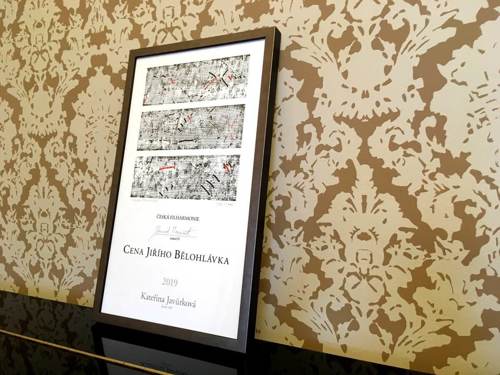
An original graphic print by the artist Jiří Voves is a part of the prize | Photo Czech Philharmonic
When we were thinking what the best way to remember Jiří Bělohlávek would be, the open-air concert won unanimously because of its relaxed atmosphere and its connection to young soloists who Jiří Bělohlávek had been supporting throughout his life. Starting this year, every open-air concert will be dedicated to the memory of Jiří Bělohlávek and will be also connected with the prize-giving ceremony bearing his name.
My husband had met some good souls on his way who supported him at the start of his career, and he wanted to send this good further. He always enjoyed working with young musicians and found that work fulfilling. Anyone who teaches will tell you that students can inspire, and that one can learn from them and get energy from them.
It is beautiful that what Jiří Bělohlávek started lives on, and that young musicians continue to be supported. It is the helping hand that everyone needs at some point. This is Jiří Bělohlávek’s vital legacy.
Mister Bělohlávek has a firm place in my heart as a father-like figure. And I mean it in the best sense of the word. From the very first moment I entered the Czech Philharmonic stage as a young talented musician, I had the feeling of the warmth of a family hearth. I remember my last performance with him clearly, it was in St. Vitus Cathedral and it was still cold and I came to the rehearsal dressed only lightly. Mister Bělohlávek, himself seriously ill at the time and completely bold, took away his scarf, put it round my neck and said: “You must look after that gift of yours.”
The conductor’s legacy is kept alive not only through recordings, prizes or places, but also thanks to his pupils and their conducting activities - Jakub Hrůša, Tomáš Netopil, Tomáš Hanus and others. Jakub Hrůša – nowadays one of the most important representatives of Czech musical culture and the Czech conducting school in the world – followed up gladly on the tradition established by Bělohlávek of concert performances of operas. Janáček’s opera Káťa Kabanová was supposed to be performed in this way in three subscription concerts at the Rudolfinum in April 2020, followed by performances with the same cast at the Elbphilharmonie in Hamburg. Unfortunately, the covid-pandemic made this musical feast impossible. Jakub Hrůša also shares with his teacher and friend a passion for the work of Josef Suk. After Jiří Bělohlávek, he took over the task of recording his complete orchestral works with the Czech Philharmonic for the Decca label.
In 2021, commemorating Bělohlávek’s seventy-fifth birthday, a number of remarkable programmes and texts appeared. The Czech Radio introduced in its broadcast a combined programme entitled “Týden s Jiřím Bělohlávkem” (“A Week with Jiří Bělohlávek”) where the renowned conductor was remembered in five episodes by Dagmar Pecková, Jakub Hrůša, Roman Bělor, Tomáš Netopil and Aleš Březina. The website KlasikaPlus.cz presented Bohuslav Vítek’s study “Jiří Bělohlávek a čtyři světy v opeře Hry o Marii” (“Jiří Bělohlávek and the four worlds in the opera The Miracles of Mary”) that focused on Bělohlávek’s recording of Martinů’s opera with the Prague Symphony Orchestra from 1985. In February and March, Bělohlávek’s friend Alexander Goldscheider published on his Facebook a series of twenty-four episodes entitled “Jiří Bělohlávek: Život v obrazech” (“Jiří Bělohlávek: Life in Pictures”) and beginning in May, KlasikaPlus.cz published Goldscheider’s transcription of the San Francisco Diary. Bělohlávek wrote the diary, encouraged by his friend, between May and July 2016, when he was preparing and conducting Janáček's Jenůfa in San Francisco. On the same website, Alexander Goldscheider published other interesting chapters from Jiří Bělohlávek's professional life.
The development of my relationship to what I wanted to achieve was accompanied by the development of appreciation of the conductor’s profession and its object of interest – the whole phenomenon of classical music. A young person places the development of his professional career in the centre of his activity, which he or she finds fulfilling in its own right. I think that this is a necessary stage that every artist must go through, as it helps him or her to control the professional qualities perfectly and to assess his or her own abilities. Nevertheless, it is not the final goal of an artist’s endeavour, or at least that is what I think. Perfect interpretation, which I have striven for all my life and will continue to do so, the whole effort to interpret the work accurately and to seize the thoughts hidden in the work, are all together still just some kind of aiming at something. Not something in its own right, but a way to express the composer’s and my own understanding of life and the world. I believe that art should be a vehicle of beauty and a means of making a human individual better, of lifting his soul and spirit and of enriching his or her whole life.
JIŘÍ BĚLOHLÁVEK DONOR-ADVISED FUND
The Fund was established by the family of Jiří Bělohlávek, especially his wife Anna
Fejérová, in March 2024. It is a donor-advised fund administered by the Czech Phil
Foundation with the goal to support and preserve the artistic and personal legacy of
Jiří Bělohlávek, the former Chief Conductor of the Czech Philharmonic, and to
develop all musical areas which he was most active in.
The financial resources from the Fund are primarily used for the purchase and loan of
musical instruments, for scholarships, prizes and awards, grants towards artistic and
cultural projects and financial support for organisations involved in the artistic,
cultural or educational fields.
Jiří Bělohlávek Fund is aimed especially at supporting young talented musicians.
Financial resources and support from the Fund are granted by the Board of Directors
of the Czech Phil Foundation, upon recommendation of the Grant Committee of Jiří
Bělohlávek Fund.
Members of the Grant Committee are:
- Anna Fejérová, Jiří Bělohlávek’s wife, musician
- Marie Jedličková, Jiří Bělohlávek’s daughter, Waldorf School teacher
- Zuzana Bělohlávková, Jiří Bělohlávek’s daughter, editor and mindful bodywork coach
- Tomáš Jedlička, Jiří Bělohlávek’s son-in-law, Waldorf School principal
- David Bárta, Jiří Bělohlávek’s son-in-law
- Jiří Vodička, violinist, concertmaster of the Czech Philharmonic
- Tomáš Hanus, conductor, Music Director of the Welsh National Opera
- Jakub Hrůša, conductor, Chief Conductor of the Bamberg Symphony Orchestra and Principal Guest Conductor of the Czech Philharmonic
- Marek Jerie, cellist, Guarneri Trio Praha
- Jan Bartoš, pianist
The fund currently owns:
- A cello from the 19th century, donated by Marek Jerie, currently used by
Barbora Cipriánová, a conservatoire student - A Petrof piano from 1939 formerly owned by Chief Conductor of the Czech
Philharmonic Jiří Bělohlávek, donated by Anna Fejérová. The piano is currently
located in the Villa Hernych in Ústí nad Orlicí where it is used for chamber
music concerts as well as competitions of young talents.
Further, the Fund has provided scholarships for young conductors to take part in
masterclasses abroad and has also supported summer music courses for young
musicians in Litomyšl.
If you would like to support Jiří Bělohlávek’s legacy please make a one-off or regular
donation to the Fund - thank you very much.
If you have any questions, please contact Mrs.Dagmar Caspe, Executive Director of
the Czech Phil. Foundation - Dagmar.Caspe@ceskafilharmonie.cz.
Jiří Bělohlávek Donor Fund
The bank account number with Česká Spořitelna is: 6643716309/0800
IBAN: CZ 41 0800 0000 006643716309
BIC: GIBACZPX
Owner of the bank-account is the Czech Philharmonic Foundation.
Main sources
- 1.
Alexander Goldscheider: Jiří Bělohlávek (9) Co všechno odešlo. KlasikaPlus.cz 2021 (19. 7.) Available online.
- 2.
KONRÁD, Daniel: Českou filharmonii ochráním, její hráči mají talent od boha, říká nový šéfdirigent Semjon Byčkov. Hospodářské noviny 2018 (2. 10.). Available online
- 3.
Redakce: Film o Jiřím Bělohlávkovi míří do kin. Opera Plus 2019 (25. 9.). Available online
- 4.
BARYLOVÁ, Hana: Zrodila se Cena Jiřího Bělohlávka. Magazín České filharmonie 2017 (27. 6.) Available online
- 5.
BARYLOVÁ, Hana: Zrodila se Cena Jiřího Bělohlávka. Magazín České filharmonie 2017 (27. 6.) Available online
- 6.
SOJKOVÁ, Alena: Česká filharmonie nabízí muzikantům podanou ruku, říká loňský laureát Ceny Jiřího Bělohlávka Robert Kružík. Magazín České filharmonie 2021 (16. 6.) Available online
- 7.
BŘEZINA, Luděk: Cenu Jiřího Bělohlávka získal tenorista Petr Nekoranec. Opera PLUS 2022 (22. 6.) Available online
Alexander Goldscheider: Jiří Bělohlávek (9) Co všechno odešlo. KlasikaPlus.cz 2021 (19. 7.) Available online.
KONRÁD, Daniel: Českou filharmonii ochráním, její hráči mají talent od boha, říká nový šéfdirigent Semjon Byčkov. Hospodářské noviny 2018 (2. 10.). Available online
Redakce: Film o Jiřím Bělohlávkovi míří do kin. Opera Plus 2019 (25. 9.). Available online
BARYLOVÁ, Hana: Zrodila se Cena Jiřího Bělohlávka. Magazín České filharmonie 2017 (27. 6.) Available online
BARYLOVÁ, Hana: Zrodila se Cena Jiřího Bělohlávka. Magazín České filharmonie 2017 (27. 6.) Available online
SOJKOVÁ, Alena: Česká filharmonie nabízí muzikantům podanou ruku, říká loňský laureát Ceny Jiřího Bělohlávka Robert Kružík. Magazín České filharmonie 2021 (16. 6.) Available online
BŘEZINA, Luděk: Cenu Jiřího Bělohlávka získal tenorista Petr Nekoranec. Opera PLUS 2022 (22. 6.) Available online
